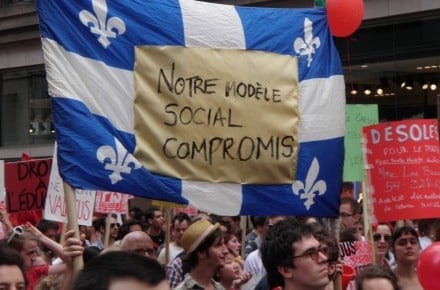Ahmed Sahi: A dangerous form of nationalism is taking root on the right. It’s time to refocus on nation-building and a movement that loudly rejects Islamophobia and fear.
Tag Archives: nationalism
The meaning of a meeting of Europe’s leading nationalist minds
In Koblenz, Germany, the leaders of Europe’s nationalist movement unite for an awkward political spectacle
What’s next for Quebec students?
Tuition hike protest is about more than just money
One of these things is just like the other
Andrew Potter on Harper’s loyalty to Canada
Stephen Harper and Canada, a love story (II)
After Paul Martin’s campaign mocked Mr. Harper’s response to a question about love of country, Jason Kenney demanded an apology for the attack of Mr. Harper’s patriotism. He then cast aspersions on Mr. Martin’s.
Stephen Harper and Canada, a love story
Judging from the Conservative party’s campaign slogan (“Here for Canada”) and the placard that adorned the Prime Minister’s lectern yesterday (“Canada”) and the giant flag behind him (Canadian), not to mention the actual content of Sunday’s speech—some of which was presaged by a speech to supporters last fall—Mr. Harper’s preferred ballot question would seem to be this: Who loves Canada most? Or, put as less of a question: I love Canada more than Michael Ignatieff.
Is this what a post-nationalist Quebec looks like?
In December 2008, just after Jean Charest’s third consecutive election victory, I wrote this: “Like Bourassa, Charest has positioned himself as both a critic of the federal government and a supporter of the federation.” At the time, I thought it was Charest who’d turned a corner, who’d come to understand that nationalism is an essential characteristic of Quebec politics, and that it could be embraced and molded to fit even a federalist’s political agenda. I wrote it half-expecting Charest to spend 2009 burnishing his Captain Quebec credentials by picking meaningless fights with the federal government. But, barring a few minor exceptions, those battles never materialized.
Nortel, and our techno-nationalist delusions
Whatever the merits of subsidizing Nortel’s past research, blocking the Ericsson sale won’t get the money back
Nortel and the Avro Arrow myth
Andrew Coyne on the weakest part of RIM’s case
So, Stephen, which one’s the half?
Isn’t it fun that both the current opposition and government leaders were doing interviews on referendum night in 1995?



